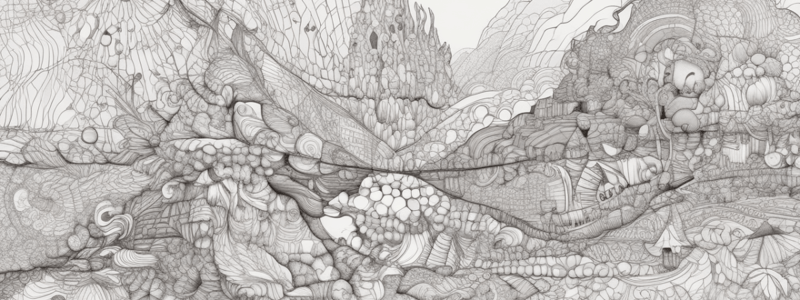Podcast
Questions and Answers
What is the direction of the relationship between wellbeing (X) and depression (Y)?
What is the direction of the relationship between wellbeing (X) and depression (Y)?
- As wellbeing increases, depression also increases
- As wellbeing decreases, depression increases
- As wellbeing increases, depression decreases (correct)
- There is no correlation between wellbeing and depression
Which of the following would strengthen a correlation coefficient?
Which of the following would strengthen a correlation coefficient?
- Removing an outlier that is supporting the correlation
- Increasing the sample size (correct)
- Adding an outlier that is not supporting the correlation
- Sampling from a restricted range
What is the main difference between correlation and causation?
What is the main difference between correlation and causation?
- Correlation is a statistical relationship, while causation is a cause-and-effect relationship (correct)
- Correlation is a cause-and-effect relationship, while causation is a statistical relationship
- Correlation is a mathematical concept, while causation is a scientific concept
- Correlation is a statistical term, while causation is a psychological term
What is the interpretation of a correlation coefficient of 0.8?
What is the interpretation of a correlation coefficient of 0.8?
Which of the following correlation coefficients indicates the strongest relationship between two variables?
Which of the following correlation coefficients indicates the strongest relationship between two variables?
What is the primary limitation of correlational research in terms of casual relationships?
What is the primary limitation of correlational research in terms of casual relationships?
What is the range of the correlation coefficient (Pearson's r)?
What is the range of the correlation coefficient (Pearson's r)?
What is the primary goal of predicting outcomes in correlational research?
What is the primary goal of predicting outcomes in correlational research?
What is the key difference between simple regression and multiple regression?
What is the key difference between simple regression and multiple regression?
What is the primary advantage of using hierarchical regression over simple regression?
What is the primary advantage of using hierarchical regression over simple regression?
What is the primary concern when extrapolating the findings of a correlation analysis to other situations or samples?
What is the primary concern when extrapolating the findings of a correlation analysis to other situations or samples?
A correlation coefficient of r =.79 between chocolate consumption and Nobel Prize winners might imply:
A correlation coefficient of r =.79 between chocolate consumption and Nobel Prize winners might imply:
What is the main difference between a reliable measure and a valid measure in correlation analysis?
What is the main difference between a reliable measure and a valid measure in correlation analysis?
Which type of sampling is most likely to produce a biased sample?
Which type of sampling is most likely to produce a biased sample?
What is the purpose of calculating a correlation coefficient in correlation analysis?
What is the purpose of calculating a correlation coefficient in correlation analysis?




